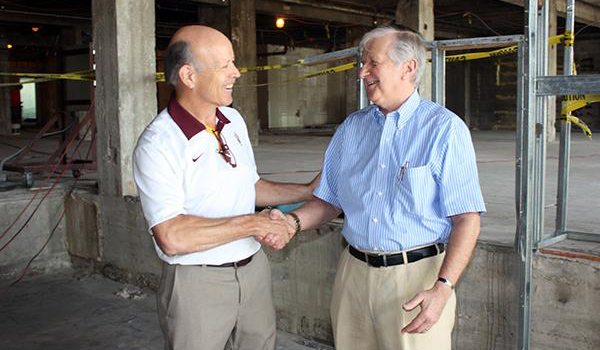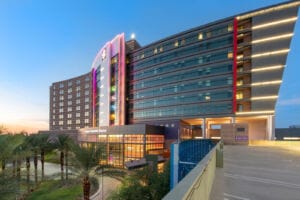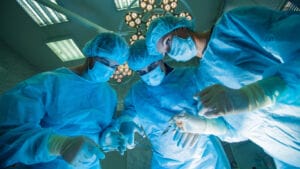|
Residents who live in a landmark downtown Phoenix affordable housing high-rise will benefit from a new state-of-the-art clinic being built by Arizona State University (ASU) through its Center for Applied Behavioral Health Policy. The facility will also serve as a valuable training ground for students working under faculty supervision. The new facility was made possible by a lease recently approved by the US Department of Housing & Urban Development (HUD) between ASU and PAG-CDG (Westward Ho developers and property managers). John Bentz, president of PAG said, “This is a rare project for HUD due to the lease and the related programming in the facility. We are proud that it is happening right here in downtown Phoenix.” The College of Public Service and Community Solutions is leasing 15,000 square feet of space on the first floor of the Westward Ho building but this is not the beginning of the relationship. ASU nursing students currently provides residents with health services such as blood pressure checks, nutritional help, and disease prevention programs. The expanded facility will also give residents access to counseling, referral services, community assistance as well as educational and cultural enrichment opportunities. The clinic will provide hands-on experience and professional development training for students majoring in social work, nutrition, therapeutic recreation, and nursing. “We could not be more excited about this unique opportunity to put the design imperatives of Arizona State University and our College into practice. An integral part of our mission is to fuse research, service and learning. This innovative partnership does exactly that; And the Westward Ho initiative exemplifies our dedication to developing collaborative solutions in our community,” said Jonathan Koppell, dean of the College of Public Service and Community Solutions. “Establishing an ASU presence within this historic landmark of our community is the embodiment of our university’s commitment to community embeddeness”, said Dr. Michael S. Shafer, professor of Social Work and director of the ASU Center for Applied Behavioral Health Policy in the College of Public Service and Community Solutions. The 16-story Westward Ho is a historically significant building. It opened as a hotel in 1928 with 600 elegant rooms. With the exception of one building in Long Beach, California, the hotel was the tallest reinforced concrete structure west of the Mississippi. Its famous Thunderbird Room was added in 1951. The 1,000-seat dinner theater was the site for many grand Phoenix society receptions. In 1979, the 600-room hotel was converted to affordable housing. Today, Westward Ho is a 289 unit ‘elderly preference’ affordable housing development within ¼ mile from a light rail station and close to downtown amenities.
“We are happy to have Arizona State University here providing health and social services, “ said Mildred Webb, an 84-year-old resident at Westward Ho. “They have helped me and others many times and now my life is better. I am very happy they are expanding.”
“It is great to have companies such as PAG-CDG investing in the community as they have done for over twenty years,” said Councilman Michael Nowakowski, District 7. “Top that with ASU’s Center for Applied Behavioral Health Policy running some of the most innovative social programs in the country, and we have a great one-of-a-kind neighborhood asset.” said Councilman Nowakowski.
In addition to renovating office space for the faculty, staff, and students that work at the Center for Applied Behavioral Health Policy, Westward Ho plans to repair and upgrade various building components including central plant mechanical and plumbing system repairs and replacement of select in-unit features.
“The lease represents the culmination of years of discussions with ASU and will be a true community asset, not only to the residents of Westward Ho, but also the general public,” said John Bentz of PAG-CDG. “Having ASU expand North of Fillmore Street for the first time will help activate this area of Central Avenue and improve its walkablilty. This is a great example of a public-private initiative between multiple organizations coming together to create a unique and special community asset.” The clinic is scheduled to open in the third quarter of 2015. |




